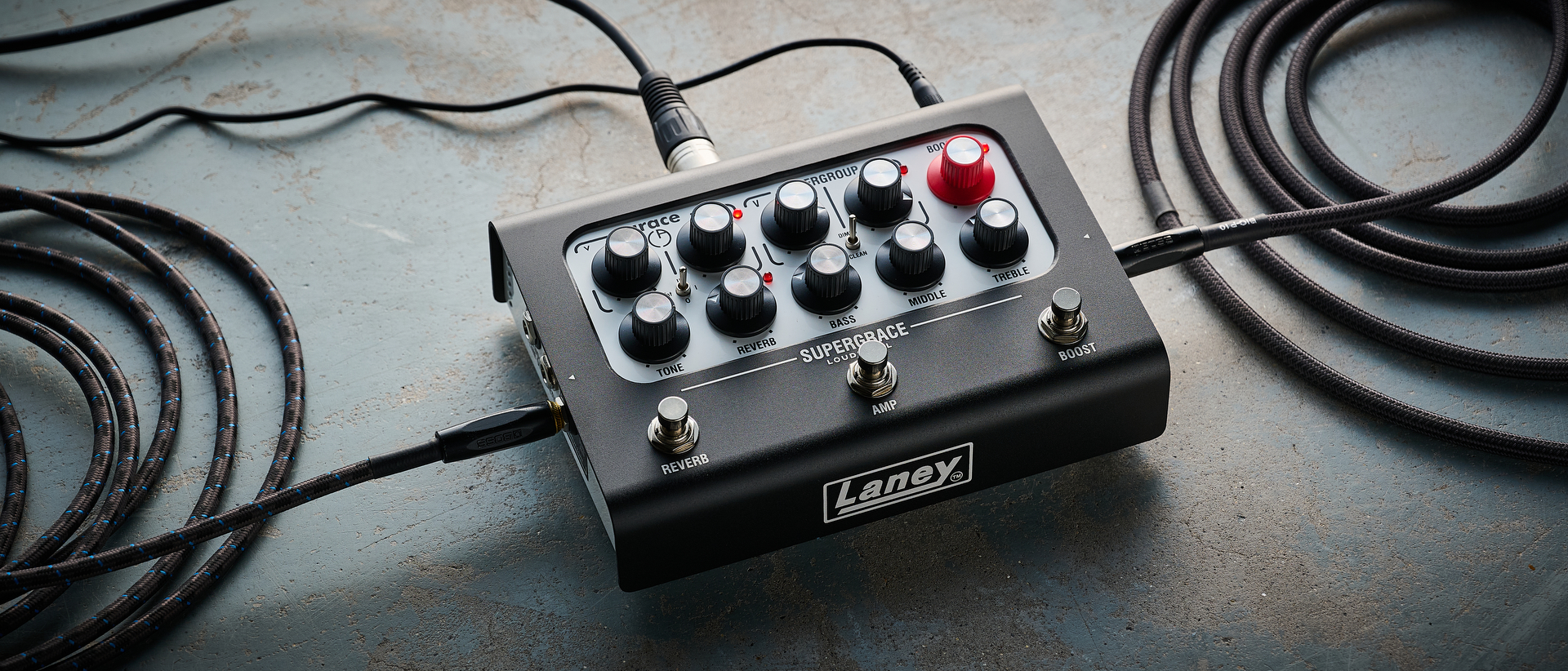All the latest guitar news, interviews, lessons, reviews, deals and more, direct to your inbox!
You are now subscribed
Your newsletter sign-up was successful

Truly a guitar god, Jimmy Page is one of the most captivating soloists the rock world has ever known.
Daring, spontaneous, melodic, bluesy, diverse, flashy, breathtaking and, yes, sloppy, all are adjectives befitting his singular style. And while Page may occasionally crash and burn, the next moment he's sure to be soaring to unprecedented heights. Let's check out some of his most electrifying licks.
The Licks
FIGURE 1A contains the basic blues phrase that Page used to launch many a killer lick. You'd be hard-pressed to find an early Zeppelin rocker—“Good Times Bad Times,” “Communication Breakdown,” “Dazed and Confused,” “Whole Lotta Love,” “The Lemon Song” and “Moby Dick,” to name a handful—that doesn't feature this move in one permutation or another. Practice the phrase with various picking strategies, including raking (all downstrokes), a down-down-up pattern, and hybrid picking (pick and fingers).
FIGURE 1B features a 16th-note variation on the same lick; note the rhythmic displacement here—the accents now fall on shifting parts of the measure, rather than always on the downbeat. Page uses this approach in the opening measures of his solo on “Good Times Bad Times” (from Led Zeppelin).
FIGURE 1C reverts to a triplet feel and adds 2nd-string pull-offs; this phrase recalls the one Page cycles in the double-time section of “Dazed and Confused” (Led Zeppelin).

Throughout Page's diverse solos, there is one common thread: thematic repetition. While some themes appear as extended melodic phrases (as in the opening bars of “Black Dog,” “Over the Hills and Far Away” and “Achilles Last Stand”), many come in the form of cycled adjacent-string licks carved from major (1–2–3–5–6) and minor (1–b3–4– 5–b7) pentatonic scales.
FIGURE 2A is an E minor pentatonic–based (E–G–A–B–D) sextuplet figure played on the top string pair. Perhaps the most famous example of this lick comes at the end of the “Stairway to Heaven” solo (Led Zeppelin IV, a.k.a. ZOSO).
All the latest guitar news, interviews, lessons, reviews, deals and more, direct to your inbox!
Consistent picking direction is the key for getting this one up to speed (try up-down or down-down). FIGURE 2B mixes triplets with straight 16ths in a hammer-on/pull-off flurry of E minor pentatonic notes. FIGURE 2C mixes A major (A–B–C#–E–F#) and A minor (A–C–D–E–G) pentatonics in the same pattern Page uses to cap his solo on “Heartbreaker” (Led Zeppelin II). FIGURE 2D is pure A minor pentatonic. Listen for this one in the stop-time section of “Rock and Roll” (Led Zeppelin IV). Picking down-down here should make for the best outcome.
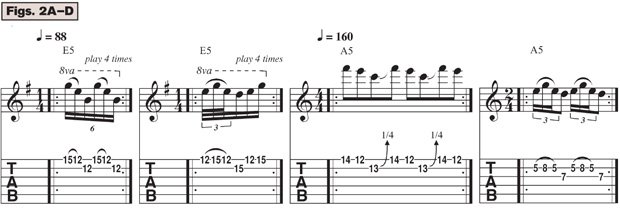
Page's lines are also peppered with scale sequences. FIGURE 3A is a pull-off-fueled, groups-of-three sequence that cascades down the E minor pentatonic scale in 12th position. Page fires off a similar line in the outro solo of “Good Times Bad Times” (Led Zeppelin). FIGURE 3B is a six-note sequence that travels up the neck via the A minor pentatonic scale. This one's a bit trickier, as it employs hammer-ons, pulloffs, and slides. Work through both examples slowly, gradually increasing the tempo as you master the moves.

Page employs plenty of string bending in his solos. FIGURE 4A demonstrates unison bends, as heard at the end of “Stairway to Heaven.” For the first two dyads, keep your 1st finger fixed on the 1st string; and, with your 4th finger, bend the 2nd string to match the pitch of the 1st string. Use your 3rd finger for the 3rd-string bends.
FIGURE 4B shows Page's superhuman over-bends (“The Lemon Song” and “Whole Lotta Love” [Led Zeppelin II]). Such bends take some muscle, so give the string a good yank-just don't hurt yourself. FIGURE 4C shows Page's pedal steel-influenced bends as heard in “Over the Hills and Far Away” (Houses of the Holy) and “All My Love” (In Through the Out Door). Keep your 4th finger fixed on the 1st string while you bend the 2nd string with your 3rd finger.
FIGURE 4D is an example of Page's behind-the-nut bends in “Heartbreaker.” As you hammer on and pull off the notes with your fret hand, reach behind the nut and push down on the 3rd string with your pickhand fingers.
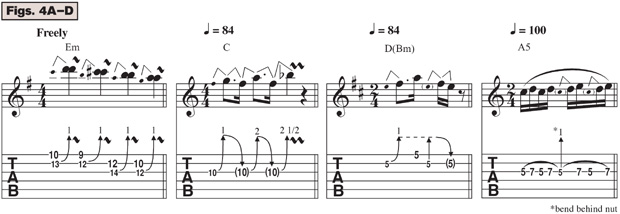
Page also shows a penchant for pulling off to open strings. FIGURE 5A features A minor pentatonic- derived pull-offs similar to the ones in “Heartbreaker.” FIGURE 5B is a sequenced minor-pentatonic-pull-off-fest that he used in “Whole Lotta Love.”

Although he was a flashy soloist, Page could turn a slow-blues phrase like no other. FIGURE 6A is inspired by his opening lick in “Since I've Been Loving You” (Led Zeppelin III). FIGURE 6B speeds things up a bit with an E blues scale (add major 7th) (E–G–A–Bb–B–D–D#) line like the one in “The Lemon Song.”
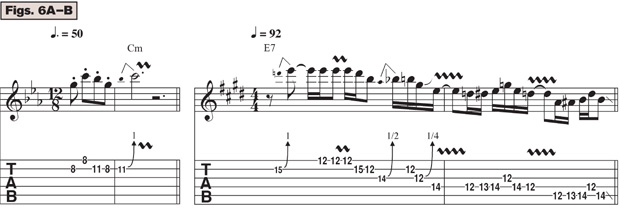
The Solo
The 20-bar, riff-driven solo [FIGURE 7] is based largely on an A5 chord. The only change occurs in measures 13-16, where C Lydian harmonies (Dadd4/C and C) modulate to E Mixolydian chords (D/E and E5). The feel is hard rock with a funk undercurrent.
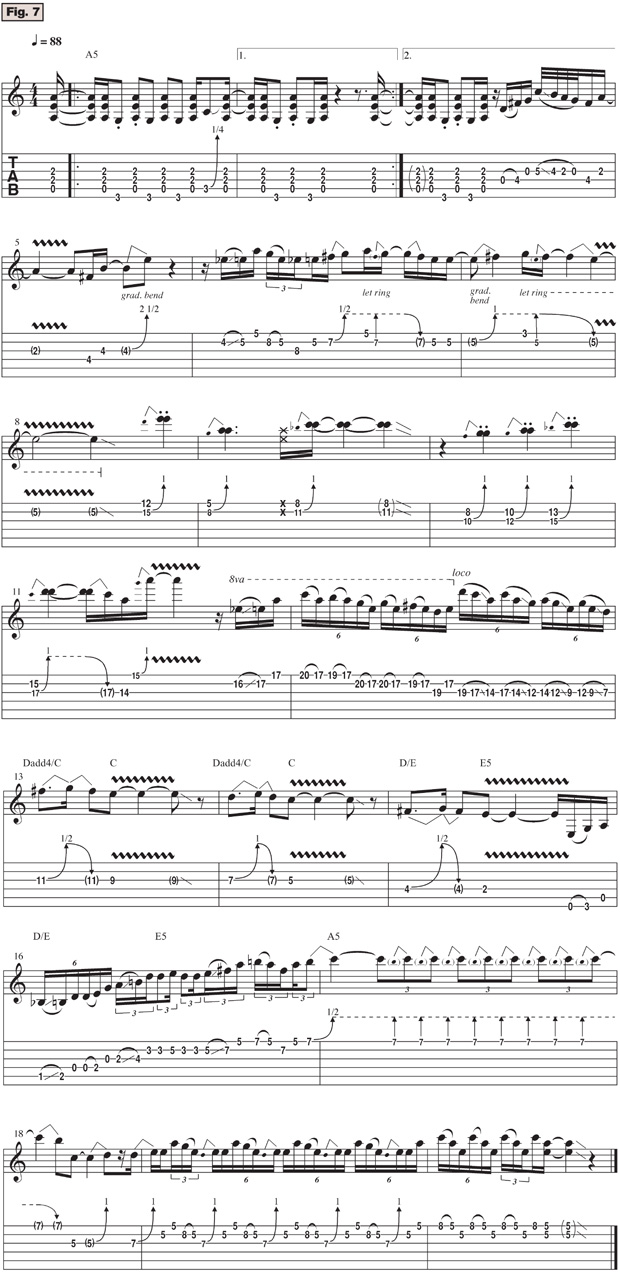
The solo opens with the lead guitar mirroring the main riff-an open-position A5 chord vamp interspersed with G and C notes. This continues for several measures before segueing to an open string-fueled A Dorian (A–B–C–D–E–F#–G) lick inspired by the opening riff of “Over the Hills and Far Away.” At measure 5, the solo begins in earnest with a gradual 3rd-string bend that spans two and a half steps (five frets!). If your guitar is sporting heavy strings, you may want to opt for a whole-step bend, from B to C#.
Next comes a squirrelly A blues (A–C–D–Eb–E–G) lick that leans heavily on the b5th (Eb). This is followed by a pair of quirky oblique bends: the first is a half-step bend from F# to G, which results in a major 2nd (G–A) rub between the 2nd and 1st strings; the second is similar, but the rub is even closer this time, with the bend producing a minor 2nd (F#–G) between the top string pair. For both moves, make sure you let the two notes ring together through the release of each bend. Measures 8–11 provide rhythmic and melodic space with a sequence of quarternote unison bends culled from the A minor pentatonic scale.
The rapid-fire phrase in measure 12 is inspired by the opening licks from the “Whole Lotta Love” solo. Fueled by pull-offs and slides down the 3rd string, it begins with the A blues scale (pickup notes), segues to A Dorian, and culminates in A minor pentatonic notes. Put the phrase together bit by bit and you'll begin to understand the sequential patterns at work.
The Dadd4/C–C changes in measures 13–14 call to mind the unique harmonies of songs like “Dancing Days” and “The Ocean.” Here, the lead guitar plays a pair of melodic motifs drawn from the C Lydian mode (C–D–E–F#–G–A–B) and decorated with 3rd-string bends and slides. Measure 15 brings D/E–E5 chord changes, and the melodic motif reaches its conclusion on the 4th string with a bend-and-release move (F#–G–F#) resolving to E.
What follows is sort of a backwards version of the pull-off licks in “Whole Lotta Love.” View this as an open-position E blues-scale pattern that segues to a 3rd position E minor pentatonic line, which in turn yields to A major pentatonic notes around 5th position. Measure 17 marks the return of the main riff with a bluesy, stuttering series of prebent C notes in a triplet rhythm.
Measure 18 contains a gradual whole-step bend from C to D, and the solo goes out with a couple of classic phrases lifted from “Communication Breakdown” and “Stairway to Heaven.”
A Musicians Institute teacher since 1989, Tom Kolb has published many books on guitar technique and been featured in instructional DVDs by Hal Leonard. He is also the author of the Soloing Strategies column in Guitar World magazine.

